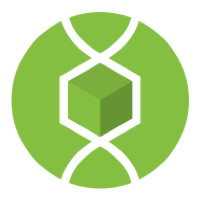
In this newsletter:
QUBES News
- Featured QUBES Partner of the Month: the National Ecological Observatory Network (NEON)
- iDigBio blog post recounts the 2019 QUBES/BioQUEST Summer Workshop
- Participation in Faculty Mentoring Networks bolsters educators’ development of Open Education Resources
- 15 leaders in biology education named as QUBES Mentors
News from QUBES Partners
- CBE – Life Sciences Education - an open access, peer reviewed source for research on teaching, learning, and education
- Catalyze undergraduate life sciences biology education reform by becoming a PULSE Fellow
- Allen Institute education resources are live!
- Apply to be a PALM fellow by October 30 to receive mentoring in teaching
Featured QUBES Partner of the Month: the National Ecological Observatory Network (NEON)
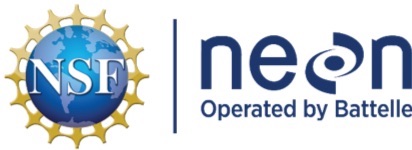
QUBES partners with organizations and groups who are doing exciting things in undergraduate education. Every so often we select one of these partners to feature in our newsletter to raise awareness of their work, celebrate recent activities, and announce upcoming opportunities.
This month’s featured QUBES partner is the National Ecological Observatory Network (NEON). NEON is an NSF-funded observation facility, operated by Battelle, that provides open access ecological data and archival samples from 81 field sites in ecosystems across the US (including Puerto Rico, Alaska, and Hawaii) for anyone to use. From genomics data to remote sensing data and hydrology to plant phenology data, the broad spectrum of data can be used in many different undergraduate classrooms. Learn more about NEON at https://www.neonscience.org.
There are a several ways QUBES users can engage with NEON:
Explore NEON Teaching Modules
NEON teaching modules are designed to build students’ data skills while exploring ecological concepts. Browse the modules posted on the NEON website and the NEON group on QUBES, two of which were featured as a QUBES Resource of the Week (see Outstanding Oaks: Quercus Phenology at NEON Sites and Environmental Drivers of Ecosystem Carbon Fluxes from Minutes to Years).
Participate in the NEON Data Education Fellows Faculty Mentoring Network (FMN)
Interested in adding quantitative reasoning and ecological data to your classroom? NEON sponsors NEON Data Education Fellows Faculty Mentoring Networks (FMNs) each fall and spring semester to support faculty using NEON data in the classroom. During this FMN, faculty participants create new materials or implement and adapt existing educational resources provided by the NEON project. Are you already teaching with NEON data? Join the FMN to share your education resource with others and prepare it for publication. If you are interested in receiving information about upcoming NEON Data Education Fellows FMNs, please join the NEON group on QUBES or subscribe to the QUBES Newsletter.
Meet NEON Data Education Fellows who participated in previous NEON FMNs and shared their open educational resources. Learn more about the NEON Data Education Faculty Mentoring Network.
Browse Materials from a Conference on Diversity, Equity, and Inclusion for Data Science in the Environmental Sciences.
NEON is also one of the collaborating organizations behind the Environmental Data Science Inclusion Network (EDSIN), whose goal is to strengthen initiatives across existing alliances and organizations to recruit and retain individuals from underrepresented groups in environmental data science careers. EDSIN hosted a conference, Bringing Conversations on Diversity and Inclusion in Data Science to the Environmental Sciences, on April 2-4, 2019 in Boulder, Colorado. You can browse conference materials here, including a presentation featured as a Resource of the Week. Presentation recordings with closed captioning will also be posted soon. Join the EDSIN group on QUBES to be a part of the community and to receive a notification when recordings become available.
iDigBio blog post recounts the 2019 QUBES/BioQUEST Summer Workshop
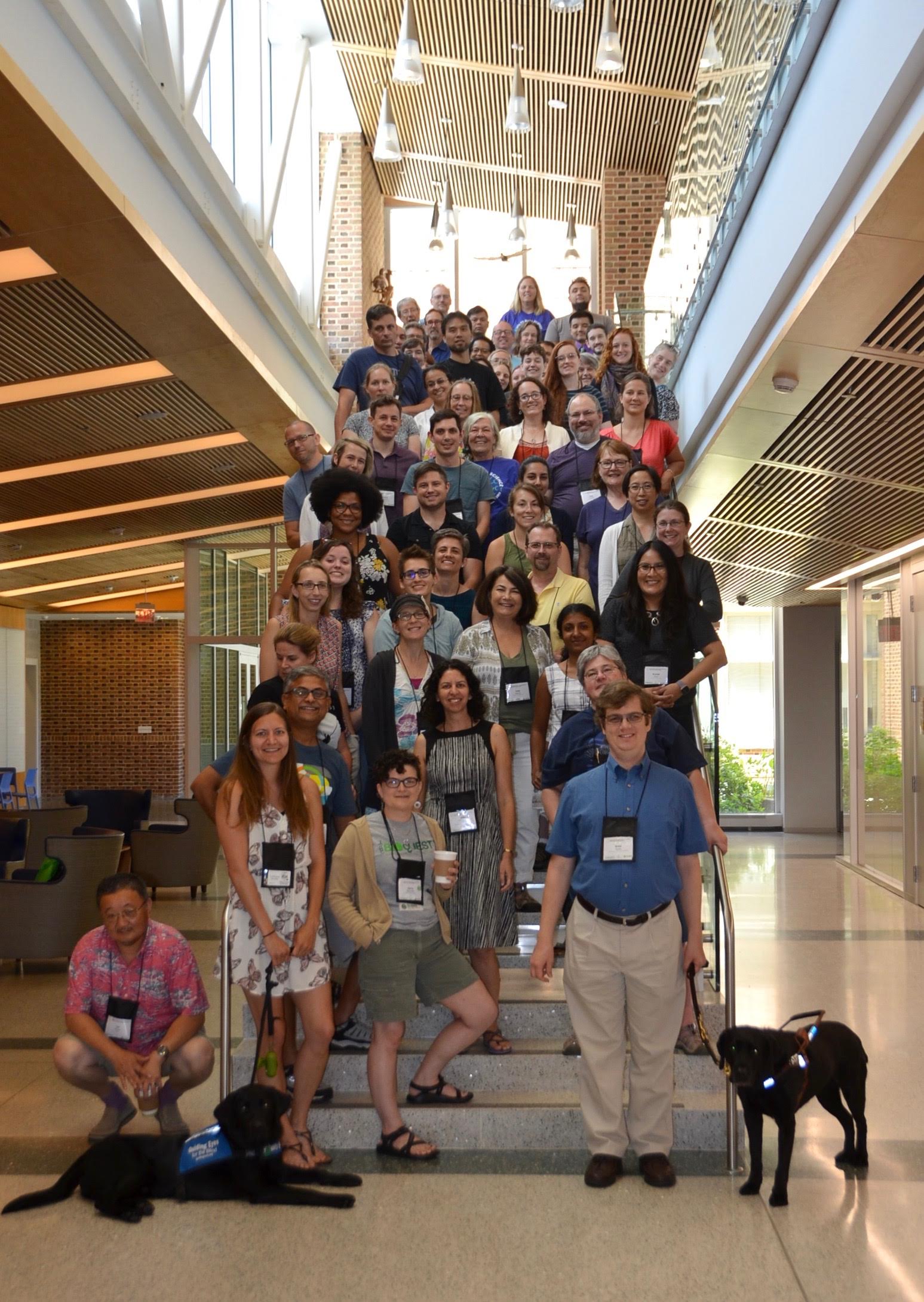
Participants in the 2019 QUBES/BioQUEST Summer Workshop.
The QUBES/BioQUEST 2019 Summer Workshop, Evolution of Data in the Classroom: From Data to Data Science, took place earlier this summer at the College of William and Mary in Williamsburg, VA. 85 participants from all across the country (no - WORLD!) came together to discuss how data science practices can enhance biology education and develop and adapt teaching materials that use data and quantitative skills to engage students with meaningful biological problems.
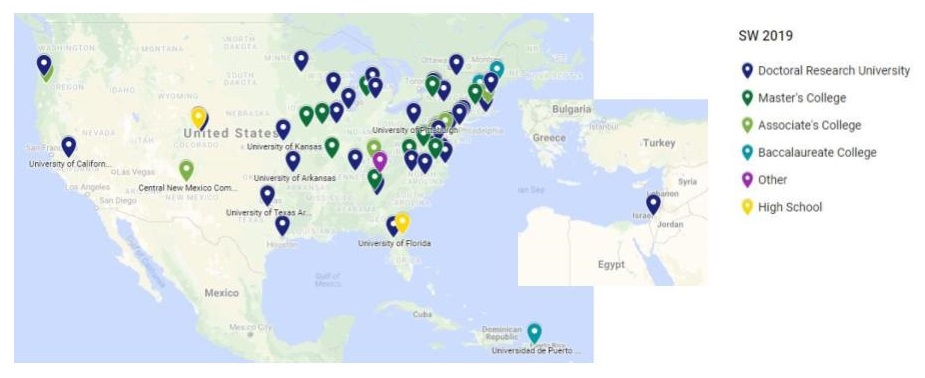
Map of participants attending the 2019 QUBES/BioQUEST Summer Workshop at William & Mary in Williamsburg, VA. Browse an interactive map here.
The summer workshop was AMAZING! But don’t take our word for it - read what Molly Phillips, iDigBio's Education, Outreach & Diversity Coordinator, had to say about her experience at the summer workshop in her recent blog post. You can also see what others had to say about the workshop at the #qbioed19 hashtag on twitter.
You can find posters and session materials presented at the 2019 QUBES/BioQUEST workshop along with presentation abstracts on the workshop website. Also, if you haven't done so already, you can subscribe to receive upcoming QUBES Newsletters where we will be sharing highlights from the summer workshop.
The QUBES/BioQUEST team is already actively planning the 2020 QUBES/BioQUEST Summer Workshop, which will be held in Pittsburgh, PA. If you are interested in receiving information about this workshop as plans continue to develop, please subscribe to receive updates.
Participation in Faculty Mentoring Networks bolsters educators’ development of Open Education Resources
QUBES offers professional development opportunities for educators called Faculty Mentoring Networks (FMNs). FMNs are a great way to receive support and guidance while implementing a new teaching module or technique. FMN participants get exposure to new teaching materials and receive expert advice from mentors and peers while adapting or creating new open education resources.
QUBES Postdoctoral Researcher, Elizabeth Hamman, has been combing through data to understand and quantify the impact of QUBES FMNs. Here’s a peek at how FMN participants are contributing to our large collection of Open Education Resources (OER).

QubesHub currently hosts over 1200 Open Educational Resources. Of these, approximately half were created by users who have participated in an FMN. Additionally, many FMNs use and modify existing resources, leading to a much larger proportion of OERs that are modifications of existing resources authored by users who have participated in an FMN.
Are you interested in participating in an FMN? Hurry! Deadlines are quickly approaching for the Fall 2019 FMNs.
15 leaders in biology education named as QUBES Mentors
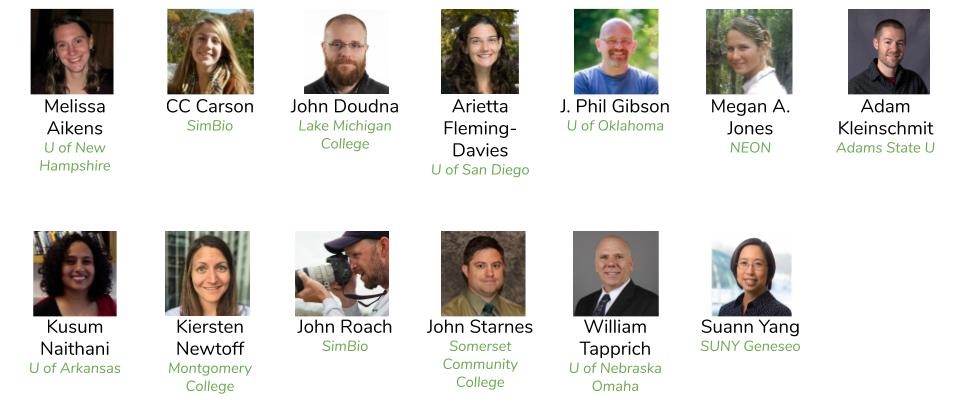
The Spring 2019 QUBES Mentors.
Not pictured: Sam Donovan and Drew LaMar.
In a press release shared recently on the QUBES Blog, QUBES announced the names of 15 leaders in biology education who are being honored for leading Faculty Mentoring Networks for teaching quantitative biology.
“The mentors are recognized for providing essential professional development and guidance for participants in semester-long Faculty Mentoring Networks (FMNs) offered through QUBES. FMNs bring together faculty from across the country and around the world—and across academic disciplines—to work together via an online platform to find better approaches and materials for teaching quantitative biology. Participants in each FMN worked together to plan and implement educational reforms in the classroom.”
This honor is also being recognized by the mentors’ home institutions, including the University of San Diego, who released a news article announcing that USD Professor Arietta Fleming-Davies has been honored as one of the 15 QUBES Mentors for the Spring 2019 semester. Read more about all 15 Spring 2019 QUBES Mentors in the QUBES press release.
CBE – Life Sciences Education - an open access, peer reviewed source for research on teaching, learning, and education
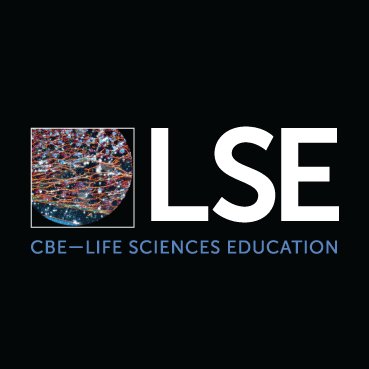
Dear Colleagues-
Given your interest in STEM education reform, I wanted to make sure you were familiar with CBE – Life Sciences Education (LSE; https://www.lifescied.org/). LSE is a freely available journal published by and for educators in the life sciences and other STEM fields. Published by the American Society of Cell Biology, the journal is a trusted, peer reviewed source for research on teaching, learning, and education. It contains highly relevant and applicable content that educators can use immediately, including:
-
Tried and tested ideas for improving teaching and mentoring
-
Data-driven strategies for improving students’ learning, development, and success
-
Evidence-based approaches for engaging students and overcoming everyday teaching challenges
-
Valid and reliable measures / assessment tools
Because LSE is open access, there are no barriers to access and no fees. You might be particularly interested in this collection of papers related to change in higher education.
You can access this collection and other articles published in LSE by visiting lifescied.org today!
Sincerely,
Erin Dolan
Editor-in-Chief, CBE-Life Sciences Education
P.S. Sign up for LSE electronic table of contents alerts at: https://www.ascb.org/publications/consent-receive-lse-alerts/
Catalyze undergraduate life sciences biology education reform by becoming a PULSE Fellow

Partnership for Undergraduate Life Science Education (PULSE) is soliciting applications from current or former life sciences faculty and/or administrators with demonstrated academic leadership experience and whose background includes substantial amount of undergraduate teaching to become PULSE Fellows. We seek faculty who are passionate about improving STEM teaching and learning at the undergraduate level. As many as 15 new PULSE Fellows will join a committed group of 45 current PULSE Fellows. PULSE Fellows are dedicated to supporting departments’ efforts to reform and make ongoing improvements in teaching and learning, to helping propel organizational change by supporting departmental and institutional leaders who are effecting such change, and to fostering inclusivity by engaging institutions of all types to reach all students. We seek individuals who have used effective strategies for the educational advancement of students from groups underrepresented in higher education and who are committed to improving student experience and success in STEM. PULSE recognizes diversity, inclusion and equity as key to our mission. In recruiting new Fellows, we seek to broaden the diversity of our community and welcome members from a variety of demographic and identity groups and with a wide variety of backgrounds who can help our programs be more inclusive, equitable, and effective. More information about the ongoing work of PULSE Fellows can be found on our website: http://www.pulse-community.org/
More information about the specific time commitment, compensation, and support for being a PULSE fellow is provided at the start of the application. Link to application: https://dartmouth.co1.qualtrics.com/jfe/form/SV_a97xkgUrKG3tx9r
Application also can be accessed via www.pulse-community.org.
PULSE welcomes applications from current and former faculty in the life sciences and related fields who are passionate about the mission of PULSE, especially:
-
individuals from racial and ethnic groups that have been traditionally under-represented in STEM
-
community-college faculty
-
individuals from minority-serving, Hispanic serving, tribal, and historically Black colleges and universities
-
individuals with science education assessment expertise
-
individuals from a variety of demographic and identity groups and with a wide variety of backgrounds
Allen Institute education resources are live!
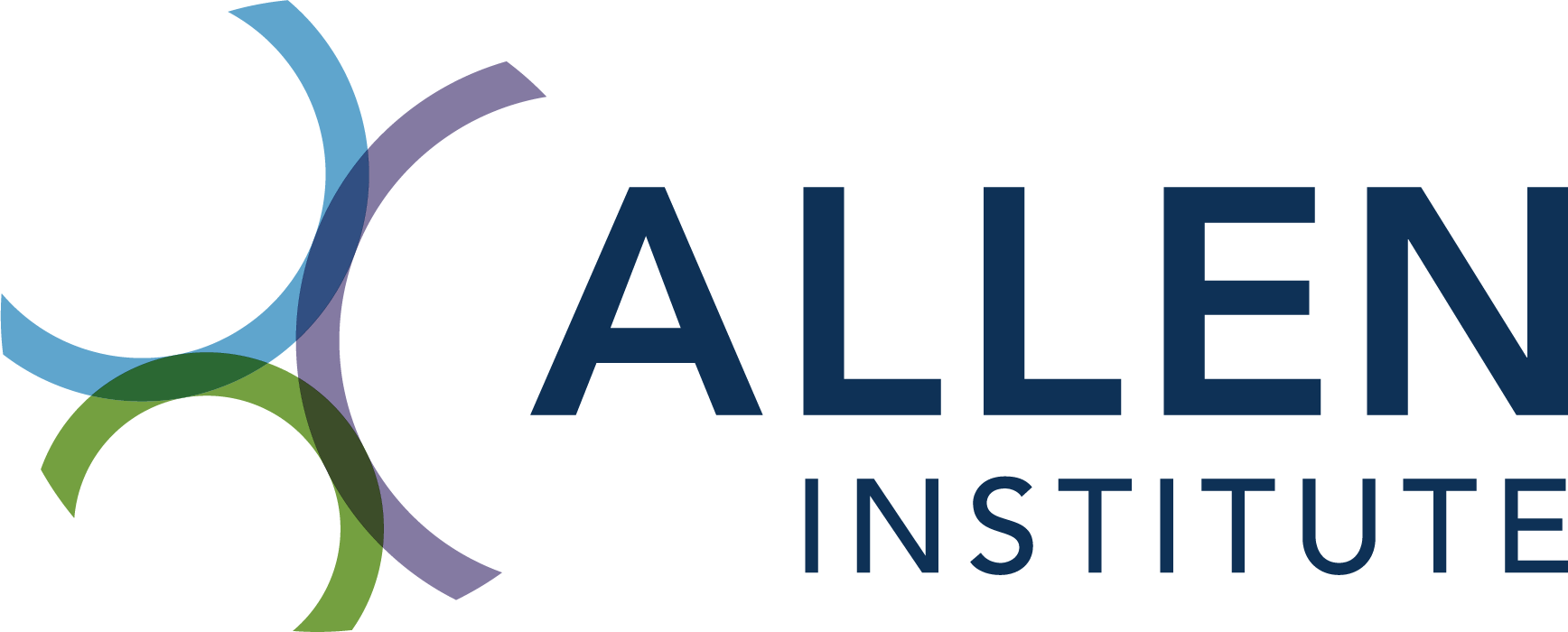
The Allen Institute now has Resources for Teachers, including posters for your classroom and lesson plans. Lesson plans are customizable, designed for high school and undergraduate biology courses, and include guided experiments using real scientific data. Browse resources for teachers at https://alleninstitute.org/learn.
Apply to be a PALM fellow by October 30 to receive mentoring in teaching

The Promoting Active Learning and Mentoring (PALM) network is now accepting applications for PALM fellows. As a PALM fellow, you will develop your abilities to teach lecture courses using active learning by working with an experienced active learning instructor. Receive up to $2000 per Fellow / $500 mentor stipend / $1000 meeting travel each for Fellow and mentor.
For more information, including eligibility requirements, application details, and to learn about how to be paired with a mentor if you don’t have one in mind, visit palmnetwork.org. Don’t miss out - the final application deadline for 2019 is October 30!
|